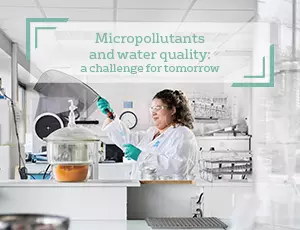By launching its Vigie-Covid-19 offer, Veolia is offering to better anticipate developments in the Covid-19 epidemic by detecting the SARS-CoV-2 coronavirus in wastewater. Using the PCR (Polymerase Chain Reaction)* method, this solution is an innovative tool that allows communities to better anticipate COVID-19 epidemic trends in their area.
In the current context, Veolia is more than ever mobilised to help fight against the spread of Covid-19. Vigie-Covid-19 is an early warning indicator of the probable circulation of the virus in the population that supports local stakeholder decision-making. This solution is based on a programme that measures traces of the SARS-CoV-2 coronavirus’s genetic material in the wastewater collected at the wastewater treatment plant over time (weekly readings). It adapts to local needs both in terms of duration (surveillance ranging from three to six months) and area (number of monitoring points dependent on geography, climate, weather, etc.).
Wastewater can indicate viral epidemics!
Vigie-Covid-19 was validated and tested throughout France via test campaigns carried out during the health crisis. This surveillance system is based on current scientific knowledge. It is based on a sampling strategy adapted to local issues, a logistics organisation, and SARS-CoV-2 analysis by PCR protocols, with results in the form of a dashboard. It warns of the possible active circulation of the virus in the population: it places the results of the analysis in their context (rainfall and number of population equivalents) and compares them with public epidemiological data. The trends in the results over time help identify a possible rebound in the epidemic.
Veolia, a partner under the Obépine project, to track down the virus in wastewater
Launched at the start of the health crisis, the Obépine (Epidemiological Observatory of Wastewater) Network measures Covid-19 traces in wastewater to detect and alert on a potential resurgence of the epidemic. This project is being jointly carried out by research teams with the support of wastewater treatment plant operators, including Veolia, local communities, and water boards.
Obépine’s first results, on about thirty treatment plants, showed that traces of viral genetic material are detectable with a high sensitivity in the wastewater. During the first epidemic peak in Paris, this early detection coincided with the influx of patients to hospitals. The choice of sampling locations, combined with detailed knowledge of the populations concerned, aims to create a ‘sentinel’ network supplementing the government’s health measures. The goal is to create a network covering the entire country based on a network of 150 wastewater treatment plants.
Monitoring wastewater to anticipate virus epidemics, a promising method!
As early as 2003, WHO recommended this approach to combat poliomyelitis (poliovirus). The international scientific community today agrees that wastewater ‘partly reflects the state of health of the population’ and can represent an ‘early’ indicator of the Covid-19 epidemic compared to ‘late’ indicators, such as hospitalisations. This approach is recommended by national and international scientific bodies: the Academy of Technologies (24 April 2020), the National Academy of Medicine (7 July 2020), and WHO (7 August 2020).
*PCR, Polymerase Chain Reaction, is an enzymatic amplification technique which allows a large number of identical copies of a DNA fragment to be obtained.



